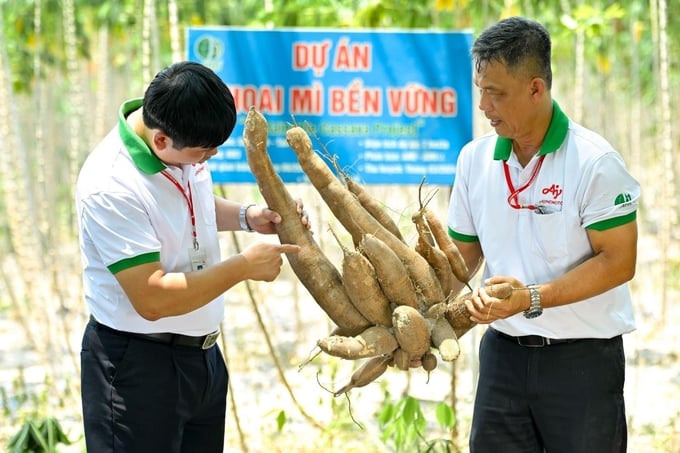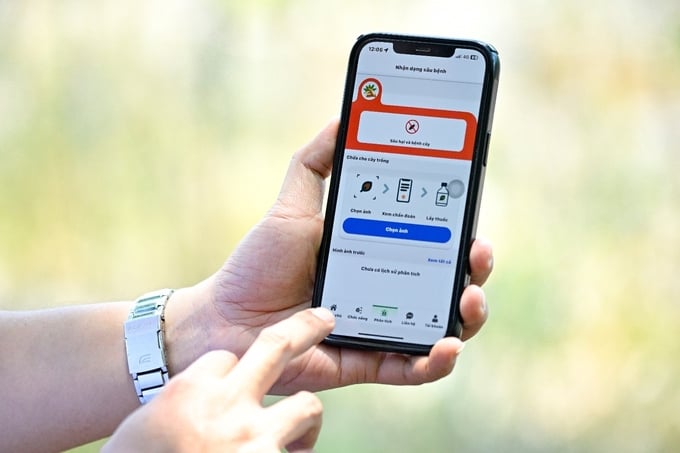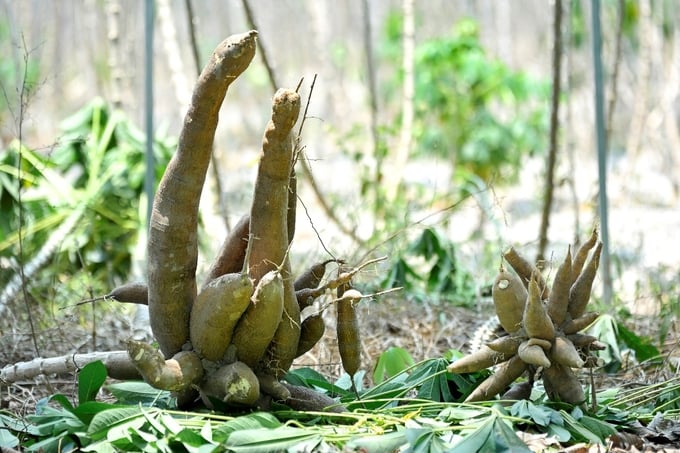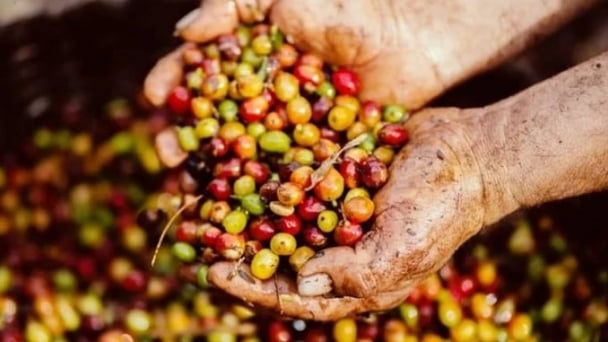June 17, 2025 | 19:48 GMT +7
June 17, 2025 | 19:48 GMT +7
Hotline: 0913.378.918
June 17, 2025 | 19:48 GMT +7
Hotline: 0913.378.918

Ajinomoto Vietnam Agricultural Development Department staff inspects new cassava varieties under the Sustainable Cassava Project.
Ajinomoto Vietnam has initiated the Sustainable Cassava Project on April 4, 2023, with the aim of assisting cassava growers in enhancing yield and improving quality of life.
Cassava is a significant agricultural commodity that holds substantial economic value. It is extensively grown in different places, including Southeast Vietnam, the Central Highlands, and the South Central Coast. Notably, provinces such as Tay Ninh, Binh Phuoc, and Dong Nai are particularly known for cultivating this crop. Traditional cassava farming methods often encounter numerous risks due to the use of low-quality varieties and the detrimental effects of mosaic disease, despite the considerable economic importance of this crop.
Nguyen Hoang Son, a cassava cultivator in Binh Phuoc, expressed: "Utilizing conventional techniques for cassava cultivation, my family frequently encounters lower yields due to pests, subpar varieties, and notably the detrimental effects of mosaic disease. This disease has resulted in a significant decline in cassava yield, amounting to a reduction of 40-50%, leading to substantial financial losses and severely impacting our family's income."
Ajinomoto Vietnam has partnered with agricultural research centers and scientists to conduct the Sustainable Cassava Project since April 2023. The project aims to assist farmers in enhancing productivity, income, and achieving stability in their life. The project encompasses a total area of 78.6 hectares dedicated to cultivating cassava. It involves the participation of 18 farming households throughout four provinces: Tay Ninh, Binh Phuoc, Dong Nai, and Ba Ria- Vung Tau.

The application "Aji Cassava" developed by Ajinomoto Vietnam Company has the ability to support the identification of pests and diseases with images.
The project offers a novel, high-yield variety called HN1, which is resistant to mosaic disease. Additionally, it provides farmers with guidance on using sophisticated production techniques. Farmers who take part in the program are provided with instruction in scientific techniques for soil preparation, planting, fertilizing, and pest control. This includes guidance on using the AMI-AMIα bio-fertilizer, which is developed and manufactured by Ajinomoto Vietnam, as a substitute for chemical fertilizers. This not only enhances the growth of cassava plants but also decreases manufacturing expenses.
After a period of 12 months, the project has had favorable outcomes, as the cassava production of the farming households included has increased significantly from 21 tons to 40 tons per hectare. Additionally, there has been an increase in the starch content, which has proven beneficial for farmers in terms of income generation and livelihood stability.
Since May 2024, Ajinomoto Vietnam has successfully created and released the "Cassava - Aji" mobile application. This application facilitates expedient identification of pests and illnesses for farmers, enables effortless monitoring of cultivation procedures and seasons, and enhances the management of cassava plant maintenance. The organization also partners with cassava purchasing groups to establish a guaranteed market, enabling farmers to cultivate with confidence.
Nguyen Hoang Son, a cassava cultivator in Binh Phuoc, joyfully expressed: "Since participating in the initiative, the production of cassava has almost doubled from 21 to 40 tons per hectare, accompanied by an increase in starch concentration." This has greatly enhanced my family's financial resources and provided stability to our lives, allowing me to pursue my creative endeavors with a sense of tranquility. Additionally, we have confidence in the existence of a market for our cassava, and there is widespread satisfaction and optimism regarding the potential expansion of the enterprise.

Comparing cassava after project development (left) and before (right) shows that cassava from the new variety HN1 is many times larger in size.
Le Huy Anh, representing the Agricultural Development Department of Ajinomoto Vietnam, stated that Ajinomoto Vietnam plans to further cooperate with agricultural authorities and experts in Vietnam to extend this model and provide assistance to a greater number of farmers in different areas throughout the country.
Furthermore, the project not only enhances the livelihoods of farmers but also aids in mitigating CO2 emissions by substituting chemical fertilizers with bio-fertilizers. Ajinomoto Vietnam plans to increase the project's scale to encompass 20,000 hectares of cassava by 2030, resulting in a reduction of more than 11,000 tons of CO2 emissions. This initiative will contribute to the mitigation of environmental effect.
Ajinomoto Vietnam has been committed to its purpose of contributing to the health and happiness of the people and society of Vietnam by offering high-quality products and important initiatives for more than 32 years in the Vietnamese market. The company aims to provide items that are both appetizing and convenient, while also catering to clients' nutritional and mental well-being, all at affordable rates.
The corporation consistently enhances the nutritional value of its current products by reducing salt and sugar content, optimizing protein levels, and expanding the availability of these improved products to a larger population.
Through ongoing research and constant improvements in amino acid technology, the Ajinomoto Group in Japan is working alongside Ajinomoto Vietnam to improve the quality of its products. This commitment aims to give consumers with nutritional value and support for mental health. Some of the noteworthy items are Aji-ngon® spice granules, Aji-Xốt toasted sesame sauce, and Blendy® instant tea.
In addition, the company actively participates in health and nutrition initiatives such as the School Meal Project, the Vietnam Nutrition System Development Project (VINEP), and the Mother and Child Nutrition Program. This program includes the software "Building a Balanced Nutrition Menu for Pregnant Women, Breastfeeding Mothers, and Children from 7 Months to 60 Months Old."
In order to guarantee efficient utilization and availability of the software, Ajinomoto Vietnam is partnering with the Department of Maternal and Child Health and the National Institute of Nutrition (Ministry of Health) to advance the initiative on a national scale.
Thus far, more than 650,000 moms have utilized the program's material to attend to their well-being, nourishment during pregnancy, and the nourishment of their children aged 5 and below. These initiatives have made significant contributions to boosting the nutritional and health status, as well as the overall well-being and happiness, of the people and society of Vietnam.
Translated by Linh Linh
![Turning wind and rain into action: [5] Hue applies modern technology in disaster forecasting](https://t.ex-cdn.com/nongnghiepmoitruong.vn/608w/files/news/2025/06/17/z6704423696987_15fd32ffc26d590d204d520c9dac6786-nongnghiep-093938.jpg)
(VAN) In Hue city, modern technology has recently been applied in meteorological and hydrological forecasting and warning, helping to reduce the damage caused by natural disasters.

(VAN) A cutting-edge farming technique being implemented on an experimental ranch in Arizona's Sonoran Desert has already saved a billion gallons of water over five years, according to Civil Eats.

(VAN) Poultry and pig production and the environment can be boosted through enhanced water technology, according to new research.

(VAN) Coffee prices on June 16, 2025 are unchanged. In Vietnam, local trading prices are holding steady, ranging around VND 112,000 – VND 112,500/kg.
![Turning wind and rain into action: [4] Bringing climate bulletins to remote and isolated areas](https://t.ex-cdn.com/nongnghiepmoitruong.vn/608w/files/linhnhp/2025/06/14/1152-z6704423696987_15fd32ffc26d590d204d520c9dac6786-nongnghiep-151141.jpg)
(VAN) The Vietnam Agriculture and Nature Newspaper interviewed Mr. Vu Thai Truong, Acting Head of Climate Change and Environment at UNDP Vietnam, to gain deeper insight into how climate bulletins are delivered to farmers.

(VAN) In Tien Giang, a high-tech shrimp farm has developed a distinctive energy-saving farming model that has yielded promising results.
![Turning wind and rain into action: [3] 300.000 farmers benefit from agro-climatic bulletins](https://t.ex-cdn.com/nongnghiepmoitruong.vn/608w/files/news/2025/06/12/e5a48259d6a262fc3bb3-nongnghiep-125122.jpg)
(VAN) The agro-climatic bulletin has become a valuable tool for farmers in the Mekong Delta. After more than five years of implementation, the initiative is gradually being expanded nationwide.